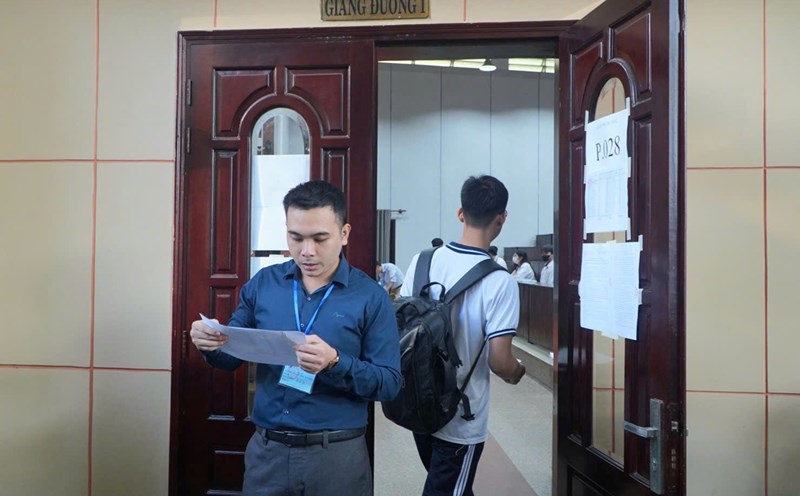Business households are more proactive, but still have problems
From June 1, 2025, the regulation on applying electronic invoices generated from cash registers for business households with a revenue of VND 1 billion/year will be officially implemented, except for cases that have registered and are using electronic invoices before this date and can continue to use the registered invoice form according to the provisions of Circular 32/2025/TT-BTC.
It is noted that in the early days of implementation, most business households have proactively coordinated with tax authorities to get acquainted with the new technology, thanks to close support from tax authorities at the grassroots level. However, the adaptation process also revealed many problems.
Ms. Nguyen Thi Trang - owner of a fashion store on Xuan La Street, Tay Ho, Hanoi - shared that during the process of implementing electronic invoices generated from cash registers, she received very enthusiastic support from tax officials. However, according to her, the initial investment cost for software and equipment is also a significant amount.
Ms. Trang also said: "Because we are not used to it, many initial procedures are quite complicated. Daily sales work is very busy, we cannot do everything by ourselves, so many households have to hire a service to support declaration and reporting. Tax officials request daily reports on the implementation situation, the situation of import - export - inventory of goods, causing the workload to increase significantly".
Similarly, Mr. Dang Van Quoc - a trader near An Dong market (District 5) - after listening to the advice of tax officials, still seemed confused. I have agreed to buy a printer, scanner and support software, but because I do not understand accounting and tax skills, I still do not know how to do it properly. I must have to hire an outside unit and ask the tax authority for support because I am afraid that I will be fined if I nhap incorrectly."
It is noted that many business households in Ho Chi Minh City have proactively accessed training sessions organized by tax branches or sought out outside accounting services to ensure compliance with regulations. However, most people hope to have a detailed roadmap and time to adapt.

Tax officials provide support throughout, including holidays
According to Official Dispatch No. 71/CD-CT recently issued by the Tax Department, the Tax branches of the region are required to establish a Steering Committee for the implementation of electronic invoices from cash registers, responsible for comprehensive direction in the area. This Committee is responsible for monitoring and counting daily results, grasping problems arising during the implementation process, ensuring completion on schedule and in full accordance with legal requirements.
Along with that, standing groups deployed by tax agency leaders have also been established to directly support households and individuals doing business - subjects directly affected by the new regulations. Units assigned to the task must publicly disclose contact information of management civil servants, maintain support throughout the day, including holidays, to promptly guide and answer problems related to electronic invoices, handle arising situations and disseminate legal regulations.
Opportunities for each small business household to connect and develop
* Dr. Nguyen Ngoc Tu - former Editor-in-Chief of Tax Magazine - said that using electronic invoices from cash registers for business households with a revenue of VND1 billion/year is not a major obstacle.
"These households are actually no different from many businesses. They have been used to paying taxes according to declarations for many years, regularly using information technology in business operations and meeting financial conditions to invest in equipment. Therefore, switching to electronic invoices does not cause much disruption". The focus of the challenge lies in the next step, which is to move the entire number of more than 5 million business households to the self-declaration and self-payment mechanism in 2025.
According to Mr. Tu, expanding electronic invoices is an inevitable requirement to promote financial transparency and build a digital economy. If the data gap from the business household area cannot be closed, the tax management system, budget expenditure, and even macroeconomic statistics will be affected. Therefore, there is no other way but to do it really resolutely, but it must also be very flexible, accompanying reality" - Mr. Tu said.
* Mr. Nguyen Quang Huy - CEO of the Faculty of Finance - Banking, Nguyen Trai University, said that electronic invoices from cash registers are an inevitable step forward, bringing transparency, modernity and creating a solid data foundation for tax and credit management. However, if there is a lack of substantial support from the policy side, this regulation can become a "digital administrative burden", pushing weak business households out of the digital process.
According to Mr. Huy, the solution needs to be ecosystematic instead of individual approaches. Regarding technology, it is necessary to standardize, test and introduce a number of minimalist, friendly, easy-to-operate, integrated software solutions connected to tax authorities, implemented by reputable technology providers for business households. It is necessary to develop "basic" digital infrastructure, where businesses can use cash registers as a subscription service - instead of having to buy expensive equipment.
In terms of finance, investing in equipment, software and learning how to operate can be a major barrier. Preferential micro-credit policies or digital transformation support funds should be implemented at the local level to accompany business households. In terms of administration, business households need to streamline procedures, the "no documents, no queues" model and especially a smart digital support channel to help quickly handle problems instead of requiring them to go directly to the tax authority.
"There needs to be a shift from the model of people reporting to an automatic data collection system. When the money computer is connected smartly, invoice data can be automatically transmitted to the tax authority without manual operation" - Mr. Huy analyzed.
He also emphasized that tax authorities should classify business households according to risk criteria to apply appropriate reporting regimes, avoiding unnecessary pressure on well-compliant groups. In the long term, we must move towards a smart tax system, in which data is operated by technology, not dependent on "keyboards" every day. From an overall perspective, experts believe that electronic invoices from cash registers are not only a technical tool, but a "bottleneck" to launch the process of legalizing the informal economic sector - which accounts for more than 30% of jobs but does not have a clear data infrastructure. If done correctly, Vietnam will not only have a modern tax system, but also an inclusive digital economy, where every small business household has the opportunity to connect and develop. Ha VY
Supporting business households to adapt to new regulations
To overcome these obstacles, the Ho Chi Minh City tax sector has proactively coordinated with relevant units to organize training and direct guidance in the area, while promoting propaganda through many channels so that businesses clearly understand the long-term benefits of applying electronic invoices. Although the implementation process still has many problems, with timely and synchronous support, it is expected that business households will gradually adapt, gradually switching to a new, more transparent and effective management method.
Mr. Phan Van Dung - Deputy Head of the Tax Department of Region II - said that Ho Chi Minh City has a large number of business households subject to implementation under Decree 70/2025/ND-CP, up to 14,773 households, due to the characteristics of the vibrant economic area and high density of business households.
The biggest difficulty in the implementation process is that many business households under contracts have not yet imagined how to make electronic invoices, use software, payment machines or connect to the internet. In particular, many household owners at large unit markets are elderly, not familiar with technology, and do not fully understand the new tax regulations.
In addition, the fear of arising costs is also a major barrier. Many households are worried about having to invest in additional equipment such as POS machines, sales management software, electronic digital signatures, etc., making it difficult to mobilize implementation.
With a large number of subjects implemented while the preparation time since the Decree was issued is relatively short, tax authorities must mobilize significant human resources and time for implementation. At the same time, technology solution providers and tax agents are also under a lot of pressure when they have to simultaneously support a large number of business households at the same time.
The implementation of electronic invoices is not only a requirement for tax compliance, but also opens up opportunities for business households to manage more professionally, access official financial services and participate more deeply in the digital economy.
The cash computer market "tests down" when the decree is issued
Welcoming the new regulation, the pre-computing equipment market witnessed a clear increase in demand. Many suppliers such as MISA, iPOS, KiotViet, Viettel, VNPT... quickly launched pre-cious computer products that integrated many utilities, meeting the requirements of connecting and issuing electronic invoices according to tax industry standards. According to the survey, depending on the features, design and level of automation, the cost of a pre-existing computer currently ranges from about 1-15 million VND. For minimalist types, just a bill printer connected to a smartphone is needed, priced from 1-4 million VND such as: Casio SE-S100 Casio cash register; Xprinter H200 cash register printer; Xprinter CSP-N160II cash register... Professional POS machines, with touchscreen, printers, integrated software, cost ranging from 6-15 million VND such as product lines: Casio SE-S300 cash register; Casio SE-S6000 cash register; iPOS iAP200s cash register; Scangle SP01; POS 320 PLUS cash register...
In addition, many units also provide equipment rental packages, package software with support services also deployed at a cost of 300,000 VND/month. Some technology enterprises also coordinate with tax authorities to organize free installation and provide on-site instructions for business households.











